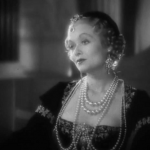 |
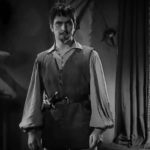 |
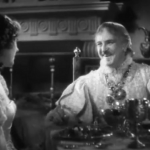 |
| The Duchess Constance Bennett |
Benvenuto Cellini Frederic March |
Duke of Florence Frank Morgan |
 |
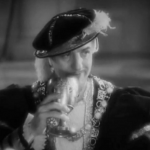 |
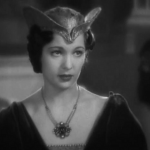 |
| Angela Fay Wray |
Ottaviano Louis Calhern |
Beatrice Jessie Ralph |
| Released by 20th Century Pictures | Directed By Gregory La Cava |
||
Proof That It’s Pre-Code-ish
- It’s a tale of adultery in the old world. The Duke of Florence’s nickname is ‘Bumpy’– ’nuff said!
- Mass murder and torture is essentially treated as a joke, as the aforementioned Duke is happy to dole out executions and give his men ‘some necks to play with’. Cellini stabs a bunch of guys and even poisons one; that’s all hand waved away by the end.
- Cellini notes, “I prefer death to a cold woman!” He also slaps the Duchess of Florence after she insults his masculinity and is about to carry her off to bed when they’re interrupted.
- The film’s ending is unbelievably pre-Code. More on that in the spoilers below.
The Affairs of Cellini: One From the Crotch
“Men like myself never happen twice!”
Costume dramas would come to dominate the films of the late 1930s, as they were both lavish and respectable– something Hollywood was trying to project after the scandalous offerings of the early 30s. If you can’t buy wit, you can certainly buy a sense of money being thrown at the screen.
The genre had its predecessors in the silent era and a number in pre-Code, but they were almost naturally more bawdy. The Affairs of Cellini has ornate set design and gorgeous costuming, but the movie isn’t exactly relying on this to put butts in seats. It’s far more concerned with trying to find a funny bone to tickle.
Affairs is an offbeat example of the bedroom farce. An artist’s model, a serial womanizer, and the ruling pair of 16th century Florence try to rearrange their coupling arrangements to little or no success, with the titular Cellini trying to prevent either the Duke or Duchess deciding that his Casanova act deserves to meet the end of a long rope.
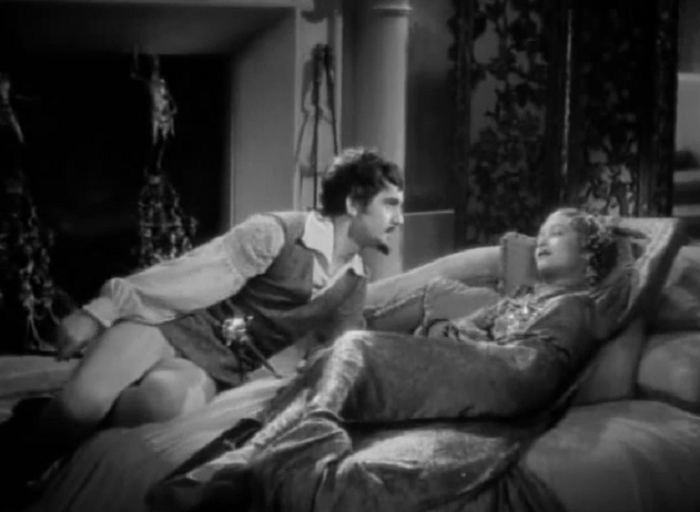
“Why don’t you come up and see me some time? Like tonight. Come up and see me tonight or I’ll have you killed. Darling.”
Benvenuto Cellini is an interesting main character. He’s a seducer, but the film shows him to be quite awful at it. His conquests are often followed by fateful encounters with jealous men who try and put a stop to him, and so Cellini only survives by his wits alone. We see as he tries to seduce Angeline, a beautiful artist’s model who seems to take a bit to catch on before she even realizes she’s being seduced and a bit while after that to overcome her constant indifference to all things and muster up any refusal.
Unfortunately for Cellini, the Duchess finds his string of lowbrow conquests and adventures to be stimulating. She commissions him to replicate a key for her boudoir and orders him to bring it later that night– without letting her husband know of it. Meanwhile, Cellini has also been engaged by the Duke to work as a glorified pimp for him as the Duke desperately wants to educate Angeline in the ways of food and flesh.
The Duke’s a buffoonish sort, which helps. The Duchess is much less so, with Joan Bennett playing her to the hilt as a dominating seductress. The best outfits in the movie are hers, which often highlight her assets handsomely. It doesn’t hurt that Bennett plays the part with delicacy, whiplashing between eroticism and jealousy at Cellini’s insolence to often bemusing results.
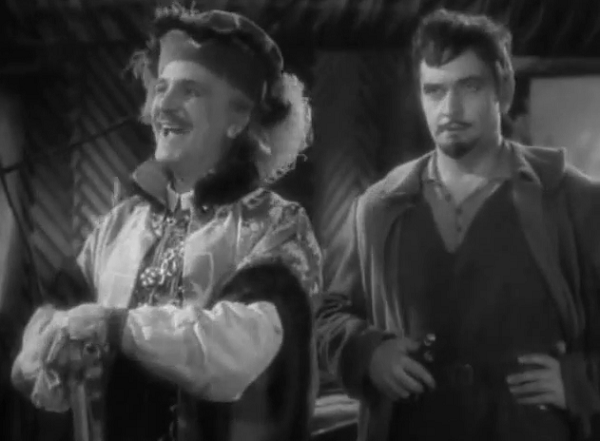
“For fun! Now arrange this tryst or I’ll kill you too, Cellini.”
What’s funny about it is that Cellini doesn’t seem to have any enthusiasm for the arrangement with the Duchess, other than in keeping himself alive. The film clearly elevates the high class, large sums of money idea of lovemaking over common tumbles in the brush. Angeline refuses to make love in a barn– a romantic hideaway for some women, but rather dull for Angeline’s new refined tastes.
Cellini is trapped between the Duchess’ wrath and the Duke’s lust, culminating in an extravagant dinner and a cup of poison. Will love survive death’s assured grip?
Spoilers.
Well, yeah. Cellini manages to switch goblets with the film’s paltry villain, Ottaviano. The Duchess realizing that Cellini’s affections for Angeline have subsided, takes him in her arms in front of the gathered celebration. The film’s conclusion shows the Duchess bringing Cellini along to the winter palace to be alone while the Duke is left in the summer palace with Angeline. This veritable agreement to continue a blatant and openly adulterous relationship is amusing and shocking.
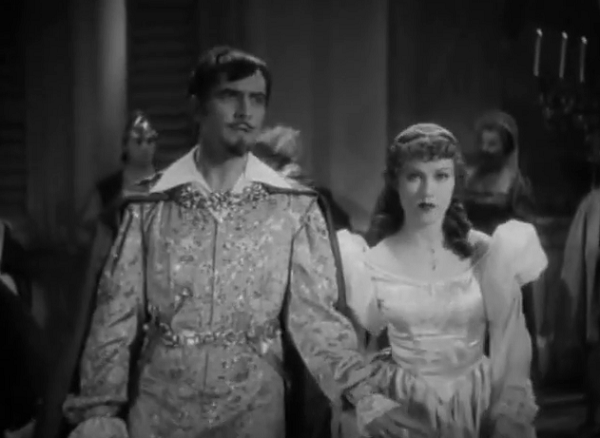
Sit down and shut up.
Again, Angeline has been seduced into the arrangement, while Cellini is merely a passenger in his own destiny. It’s extremely cynical, with the only way for him to keep on living is as a kept men. The rich keep the poor as playthings, and the poor need the rich to survive.
End spoilers.
Affairs of Cellini could almost function as a send up of Errol Flynn movies if it weren’t a half a decade too early for that. March’s weak central performance– not helped by a character whose mostly reacting to the over-the-top supporting cast– and a script that seems too cynical by half drag down the proceedings. Frank Morgan’s bumbling Duke is also more annoying than amusing, as his constant befuddlement just drones on and on.
The film’s saving graces are then Constance Bennett and Fay Wray, both playing opposite ends of the feminine romantic spectrum: the wise seducer and the coy seducee. Bennett’s slink and feline posing make her a domineering force to be reckoned with. Wray’s clueless act is especially splendid, as is her ability to cut any man down to size unintentionally.
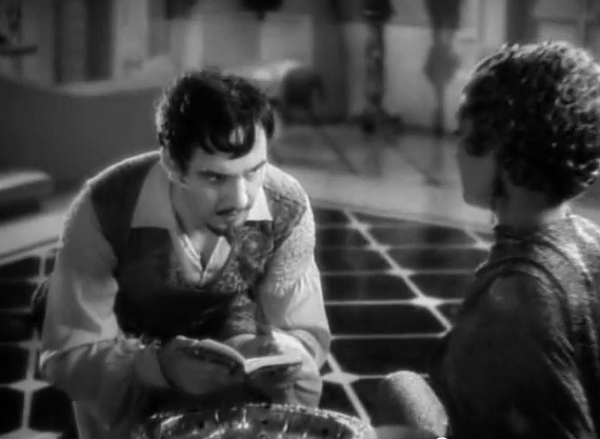
“I do not like it, Sam I Am, I do not like the idea of having my head cut off.”
One of the last really risque comedies of the early 30s, Affairs of Cellini doesn’t feel restrained or hampered in its bawdiness, but like a swift derailment of the Don Juan myth. Just because a man’s slept with hundreds of women doesn’t mean that he gets the ones he wants, and this story, as told in the 1930s, thinks that that’s alright as long as everyone ends up with a palace over their heads– summer or winter.
Trivia & Links
- It should be noted that this film is not technically pre-Code, as it was released in September 1934. Don’t ask me how it got by the censors.
- Mordaunt Hall in the New York Times says that it, “As an entertainment, it is a fitting pendant to that extraordinarily popular picture The Private Life of Henry VIII.”
- The blog And… Scene! has a host of publicity stills and images. If you need any more proof that the film is more pre-Code than not, check out the shot of Morgan feeding Wray. Wowzers.
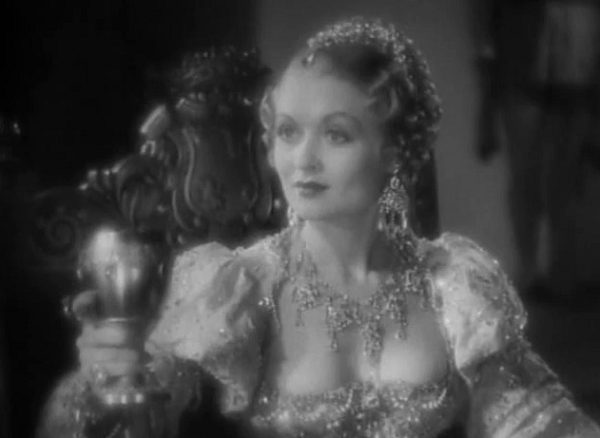
Some highly decorated decolletage.
- Laura, she of the Miscellaneous Movie Musings, caught this one on the big screen and gushes for it. She also notes that the film’s screenwriter, Bess Meredyth was married for many years to site-regular director Michael Curtiz.
- The Self Styled Siren and I share a lot of the same feelings on today’s entry (though her enthusiasm for Frederic March’s thighs in tights run much deeper than my own), and she lavishes praise on Bennett:
Here, however, we have coolly adulterous Miss Bennett as the Duchess de Medici, more Snow Queen than spitfire. As usual, Constance is the most wised-up person in the picture, going after Cellini and manipulating everyone in sight. Also as usual, Constance was the Siren’s favorite, giving just the right cynical touch to the picture’s best lines: “The tragedy of all great ladies is to discover that the men with the most exaggerated reputations make the poorest lovers. That is the reason we probably marry half-wits.”
Gallery
Hover over for controls. Right click and choose ‘view image’ to see a larger version.
Awards, Accolades & Availability
- This film appeared in the Wikipedia List of Pre-Code Films.
- Frank Morgan was nominated for Best Actor at the Academy Awards for 1934.
- This film is pretty rare, but, somewhat splendidly, someone’s uploaded a copy to YouTube.
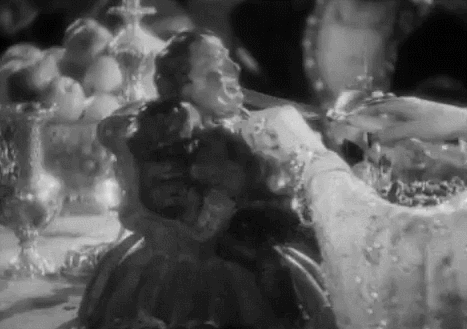 |
Comment below or join our email subscription list on the sidebar!Home | All of Our Reviews | What is Pre-Code? |




